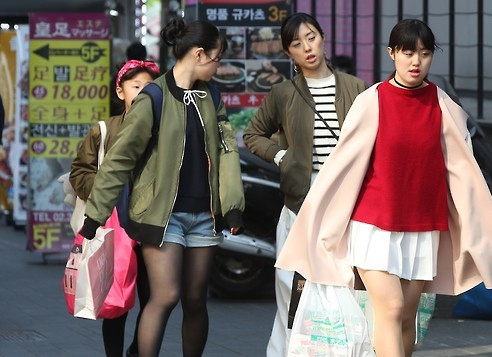South Korea's tourism and shopping industries are concerned about the potential impact of next week's long holiday following the recent drops in the number of visitors from neighboring countries, observers said Tuesday.
Both China and Japan have extended holidays from the end of this month to the first week of May. Visitors and shoppers from the two countries during the period had previously helped boost South Korea's economy suffering from weak domestic demand, but industry watchers are worried that this year will be different due to the ongoing diplomatic row with China and security issues.

Japanese visitors shop at Myeongdong, central Seoul, on March 15, 2017. (Yonhap file photo)
The number of Chinese tourists last month dropped 39.4 percent from a year ago, an immediate result of Beijing prohibiting group tours to South Korea from March 15, the Ministry of Culture, Sports and Tourism said.
The two countries are in the middle of a spat over South Korea's decision to deploy a US missile defense system on its soil, angering China who sees the move as an encroachment on its national security interests. Beijing has acted out its anger by imposing a series of economic and cultural restrictions on goods, services and exchanges of people.
South Korean officials are trying to fill the void with visitors from other countries, mainly from Japan and Southeast Asia.
The number of Japanese travelers had waned since September 2012 but started to pick up from February. The rise was nipped, however, from escalating tension on the Korean Peninsula on signs that North Korea is preparing for another nuclear test.
The tourism ministry's tally showed a 20-percent-range increase in the number of Japanese visitors up to early April when compared to last year, although this fell to between 2 to 3 percent after tension spiked. The Japanese government fanned the worries by telling its citizens to stay alert on developments in Korea.
"There is a tendency for Japanese media to exaggerate the situation on the Korean Peninsula, and Japanese travelers seem to be postponing their trips because they are concerned," a ministry official said. "We are on close watch for the developments, and we hope that there are no further provocations from the North."
South Korea's duty-free businesses are highly sensitive to the volume of travelers from the Asian neighbors, who have been big spenders and generated high profits for the industry.
Duty-free stores have been wooing Japanese customers to replace Chinese shoppers, who used to account for more than 70 percent of their clients. But Japanese tourists mostly come on individual trips, unlike Chinese visitors who take package trips, making them less likely to spend at local stores by comparison.
Sales from Chinese shoppers fell 40 percent since mid-March, after group tours were banned, and the increase from Japanese customers stopped at just 1 percent, according to industry officials. (Yonhap)






